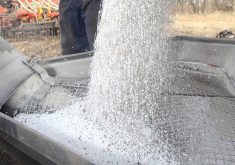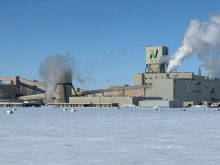CEO says it made sense during the low of the price cycle to merge with PotashCorp to speed retail growth
Farmers might want to give up on guessing when fertilizer prices will bottom out and head back up.
Even the chief executive officer of what will be the world’s largest fertilizer company is in the dark on that one.
“We get asked that question an awful lot, and the short answer is we don’t know,” said Chuck Magro, who will head the new company formed by the merger of Agrium and PotashCorp.
“I don’t think anybody can sit here and tell you we’re at the bottom or how far the bottom is away.”
Read Also

Critical growing season is ahead for soybeans
What the weather turns out to be in the United States is going to have a significant impact on Canadian producers’ prices
Magro, who is currently the CEO of Agrium, was speaking to investors at the Scotiabank Fertilizers & Chemicals Conference 2016.
The new company will be the world’s largest potash producer and the third biggest nitrogen and phosphorus manufacturer.
Prices for all three of those products are well below their five- and 10-year averages.
Magro does not know where those products are at in the price cycle, but he thinks there is more upside potential than downside. He also believes there is some short-term strength in the market.
“We have seen prices firm in potash and nitrogen in the recent weeks, and we expect that to continue in the second half of this year,” he said in a webcast of the conference.
There is good soil moisture in the Midwest this fall, so he expects strong ammonia sales.
“Speaking with our customers, we fully expect the application rates for N, P and K to be normal for the fall season and certainly moving into spring,” said Magro.
Agrium is the world’s largest crop input retailer with more than 1,400 outlets around the world.
The crop input business has been suffering with prices of major crops such as corn and soybeans below their five- and 10-year averages.
“(Farmers) are pulling back, for example, on some fungicide applications because it doesn’t pencil out,” he said.
Agrium sees the lull as an opportunity to expand its retail business by acquiring competitors that may be struggling.
It has bought 65 retail outlets this year with a combined $500 million in annual sales. That is more than double what it has done in each of the previous three years.
“This is the time in the cycle where it makes sense to do these types of arrangements, mergers and acquisitions,” said Magro.
He said the merged company will be able to accelerate the growth in the retail side of the business because it will have a stronger balance sheet and cash flow to finance the acquisitions.
The goal is to grow retail earnings before interest, taxes, depreciation and amortization by $400 million, or 36 percent over the next four years.
It will take an estimated $3 billion investment to accomplish that objective.
“We’ll have the financial horsepower to accelerate retail growth when the market conditions allow us, which is right now,” he said.
PotashCorp CEO Jochen Tilk believes government anti-trust regulators will approve the merger with Agrium.
“We don’t think nitrogen and phosphorous is an issue. There isn’t a lot of overlap between the two respective businesses,” he said.
PotashCorp has no retail outlets, so there should be no problem on that side of the business.
That leaves potash. The new company would have the capacity to produce 19 million tonnes of potash a year with an additional three million tonnes in the works.
The next biggest player is Uralkali with 11.5 million tonnes of capacity, so the new company will have a dominant position, but Tilk said there is still plenty of competition in the North American potash sector.
Offshore imports have soared in recent years, and there are new production facilities starting up or in the works.
K+S Potash Canada announced Sept. 15 the delivery of the first rail car to transport potash from its new Legacy Project mine near Bethune, Sask., to its handling and storage facility in Port Moody, B.C.
The Legacy mine is expected to reach two million tonnes of capacity by the end of next year.
BHP Billiton is still doing preliminary work for a $14 billion potash mine in Jansen, Sask., which is expected to produce eight million tonnes of potash a year.
“We think that bodes well for the anti-trust review,” said Tilk.


















